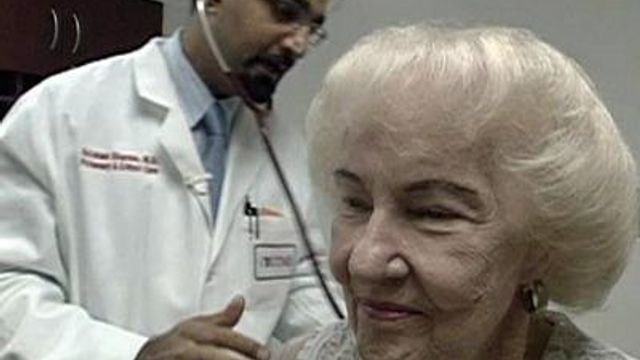Advocates call for McCrory to veto Medicaid bill
Advocates for the poor say they have collected more than 10,000 signatures on a petition asking Gov. Pat McCrory to veto legislation that would block provisions of the federal Affordable Care Act, including an expansion of North Carolina's Medicaid program.
Posted — Updated"He's only been in office a little while, and we're already turning people away at the door. That doesn't send a good message," said Kevin Rogers, policy and public affairs director of Action NC, which organized a protest outside the State Capitol.
The Medicaid expansion would cover about 500,000 low-income adults in North Carolina, providing them the insurance coverage required when the Affordable Care Act is fully implemented next year. The federal government would pick up the full cost of the expansion for the first three years and the bulk of the costs for several years after that.
"It's important that people understand what this bill will do to North Carolina and, really, all of the opportunities it's going to choke off for everyone," Rogers said.
Advocates said expanding Medicaid would bring a projected $15 billion into the state’s economy, creating an estimated 25,000 jobs in health care and related sectors by 2016.
The bill needs to pass one final vote next week in the Senate, which easily approved it last week, before heading to McCrory's desk. The governor has said he plans to sign it into law because he believes the state's Medicaid program is in such disarray that it would be foolish to expand it before fixing it.
"We just want the governor to think one more time before he signs his name to a piece of legislation that will deny hundreds of thousands of people in North Carolina coverage that they otherwise would be eligible to have," Rogers said.
Rep. Paul Stam, R-Wake, said it would be fiscally irresponsible for North Carolina to add people to Medicaid, which has had huge cost overruns in recent years.
"We have so many people on the left side of the spectrum that think of federal money as free money – Monopoly money. They're just wrong," Stam said, calling claims that the federal government would pay for the expansion "a broken promise."
Democratic Congressmen David Price, G.K. Butterfield and Mel Watt also asked McCrory to reconsider his decision. In a letter they sent to him Friday, they cited the same issues of wide health care coverage and economic benefits that advocates used to argue against the bill.
"Given the economic, fiscal and social benefits of Medicaid expansion, it is no wonder that a growing number of states – under both Democratic and Republican leadership – have chosen to implement the (Affordable Care Act) law," the congressmen wrote. "We urge you to follow this commonsense course and reject the reckless approach embodied in Senate Bill 4."
Advocates for the poor say they're concerned about more than the Medicaid bill, pointing to legislation that cuts unemployment benefits, allows the earned-income tax credit to expire and makes predatory lending legal in North Carolina.
"Thom Tillis, speaker of the House said in an unguarded moment about 15 months ago (that) we need to divide and conquer the poor, and that's really what's happening here, I think," said Adam Searing, director of the Health Access Coalition in the left-leaning N.C. Justice Center.
"I've been doing this more than 15 years. I've never seen it this bad – a real attack on low-income people who are working hard, playing by the rules," Searing said.
Senate Bill 4 also would prevent the state from creating an online health exchange to allow people who don't have employer-sponsored health coverage to shop around for their own insurance. Without state support, state residents would have to use a planned federal health exchange.
Copyright 2024 by Capitol Broadcasting Company. All rights reserved. This material may not be published, broadcast, rewritten or redistributed.






